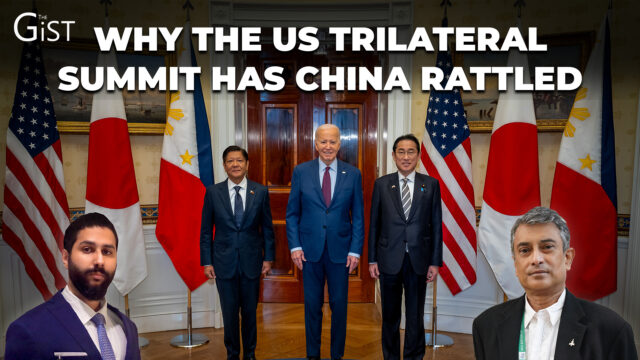The Philippines is among the very few countries in the Indo-Pacific region that has stood up to the bullying tactics of the People’s Republic of China, the other being Japan. Both have defence pacts with the United States.
So when these two nations joined the US for a trilateral summit earlier this week, a rattled Beijing was quick to announce that it “firmly opposes the relevant countries manipulating bloc politics, and firmly opposes any behaviour that provokes or lays plans for opposition, and hurts other countries’ strategic security and interests.”
But is America’s ‘ironclad’ support, as President Joe Biden and his administration reiterated during the summit in Washington, the only thing that gives President Ferdinand Marcos of the Philippines the courage to push back against China?
“It is not just because of external support,” argues Don McLain Gill, a Philippines-based geopolitical analyst author and lecturer at the Department of International Studies De La Salle University, Manila.
“Since the 1990s, there have been significant discrepancies in Philippines foreign policy decisions,” which emboldened China over the years, he said. “Today, (under President Marcos), not only is our government addressing these issues pragmatically, but our allies and our partners have also realised the need to play a more pro-active role. And what President Marcos continues to emphasise on is that this should be the benchmark that we must continue to prioritise in the long term.”
Also, while the Philippines has only one treaty ally in the US, “we have various partners, both traditional and non-traditional,” he said. These include Japan, Australia and India. “The partnership with India continues to reach new heights particularly with the March 25-27 visit of (Indian External Affairs Minister) Dr S Jaishankar to Manila, which cemented the growing momentum behind the bilateral partnership.” According to a joint statement after the visit, “Substantive discussions were held on consolidating the ongoing momentum in bilateral defence ties through capacity building, joint exercises, information exchange and defence industrial collaboration.”
To get an insider’s perspective of why Manila feels confident enough to challenge China, what India’s support means to the Philippines, and the political, economic and social compulsions that prevent other countries in the region from taking such a stand, watch the full interview.
In a career spanning three decades and counting, Ramananda (Ram to his friends) has been the foreign editor of The Telegraph, Outlook Magazine and the New Indian Express. He helped set up rediff.com’s editorial operations in San Jose and New York, helmed sify.com, and was the founder editor of India.com.
His work has featured in national and international publications like the Al Jazeera Centre for Studies, Global Times and Ashahi Shimbun. But his one constant over all these years, he says, has been the attempt to understand rising India’s place in the world.
He can rustle up a mean salad, his oil-less pepper chicken is to die for, and all it takes is some beer and rhythm and blues to rock his soul.
Talk to him about foreign and strategic affairs, media, South Asia, China, and of course India.





